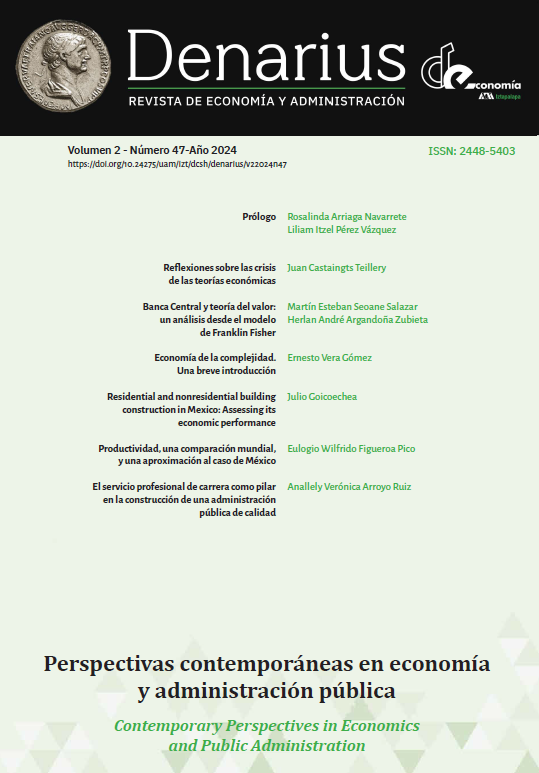Complexity Economics. A paradigm shift.
Una breve introducción.
Abstract
This research is an introduction to the economics of complexity. The Complex Adaptive Systems (cas) gives us theoretical tools as instrumental to be able to address economic phenomena better than the traditional economy. The current state of traditional economics is briefly put into context, arguing that economics as a science needs to take a step forward, to achieve a paradigm shift in modelling. We conclude that cas help us to make approximations of economic phenomena without proposing such restrictive assumptions in the initial conditions of economic models.
Downloads
References
Arrow, K. J., & Debreu, G. (1954). Existence of an equilibrium for a com-
petitive economy. Econometrica: Journal of the Econometric Society,
–290.
Arthur, W. B. (2014). The economy evolving as its technologies evolve.
Complexity and the Economy.
Arthur, W. B., Durlauf, S. N., & Lane, D. A. (2015). Process and emergence
in the economy. Complexity and the Economy, 89–102.
Arthur, W. B., Holland, J. H., LeBaron, B., Palmer, R., Tayler, P., Refenes,
A. N., & Burgess, A. N. (1997). Asset pricing under endogenous ex-
pections in an artificial stock market. Economic notes-Monte Paschi
Siena, 26 (2), 297–336.
Ball, P. (2008). Masa cr ́ıtica: cambio, caos y complejidad. Turner.
Bar-Yam, Y. (2019). Dynamics of complex systems. CRC Press.
Beckert, J. (2016). Imagined futures: Fictional expectations and capitalist
dynamics. Harvard University Press.
Beinhocker, E. D. (2007). The origin of wealth: Evolution, complexity, and
the radical remaking of economics. Random House.
Bookstaber, R. (2017). The end of theory: Financial crises, the failure of
economics, and the sweep of human interaction. Princeton University
Press.
Darley, V. M., & Kauffman, S. A. (2018). Natural rationality. In The
economy as an evolving complex system ii (pp. 45–80). CRC Press.
Fern ́andez, G. P., A. (2016). Din ́amica ca ́otica en econom ́ıa. Madrid: Delta,
Publicaciones Universitarias.
Georgescu-Roegen, N. (1996). La ley de la entrop ́ıa y el proceso econ ́omico.
Fundaci ́on Argentaria Madrid.
Glattfelder, J. B. (2013). Decoding complexity: uncovering patterns in eco-
nomic networks. Springer.
Glimcher, P. W., & Fehr, E. (2013). Neuroeconomics: Decision making and
the brain. Academic Press.
Goldstein, D. G., & Gigerenzer, G. (2002). Models of ecological rationality:
the recognition heuristic. Psychological review , 109 (1), 75.
Holland, J. H. (2004). El orden oculto: De c ́omo la adaptaci ́on crea la
complejidad. Fondo de cultura econ ́omica.
Holling, C. S. (2001). Understanding the complexity of economic, ecological,
and social systems. Ecosystems, 4 , 390–405.
Keynes, J. M. (2014). Teor ́ıa general de la ocupaci ́on, el inter ́es y el dinero.
Fondo de cultura econ ́omica.
Knight, F. H. (1921). Risk, uncertainty and profit (Vol. 31). Houghton
Mifflin.
Miller, J. H., & Page, S. E. (2009). Complex adaptive systems: an introduction
to computational models of social life: an introduction to computational
models of social life. Princeton university press.
Rosas S ́anchez, G. A., & Vera G ́omez, E. X. (2024). Algoritmo social de
elecci ́on: Alternativa al determinismo neocl ́asico. Revista de Econom ́ıa
Institucional , 26 (50), 105–128.
Simon, H. A. (1955). A behavioral model of rational choice. The quarterly
journal of economics, 99–118.
Smith, A. (2004). Teor ́ıa de los sentimientos morales (Vol. 2). Fondo de
cultura econ ́omica.
Soros, G. (2015). The alchemy of finance. John Wiley & Sons.
Copyright (c) 2024 Denarius

This work is licensed under a Creative Commons Attribution-NonCommercial-ShareAlike 4.0 International License.














